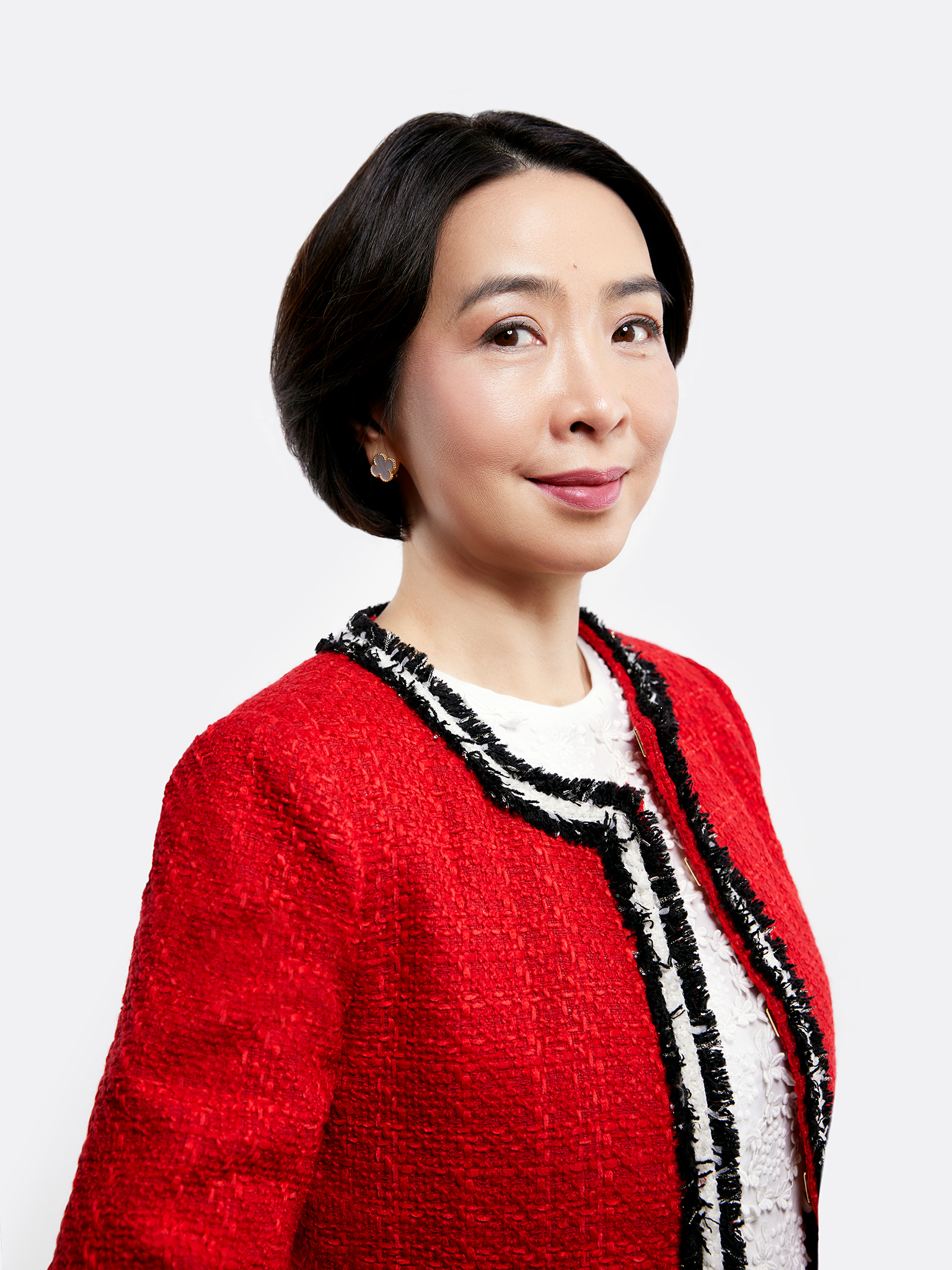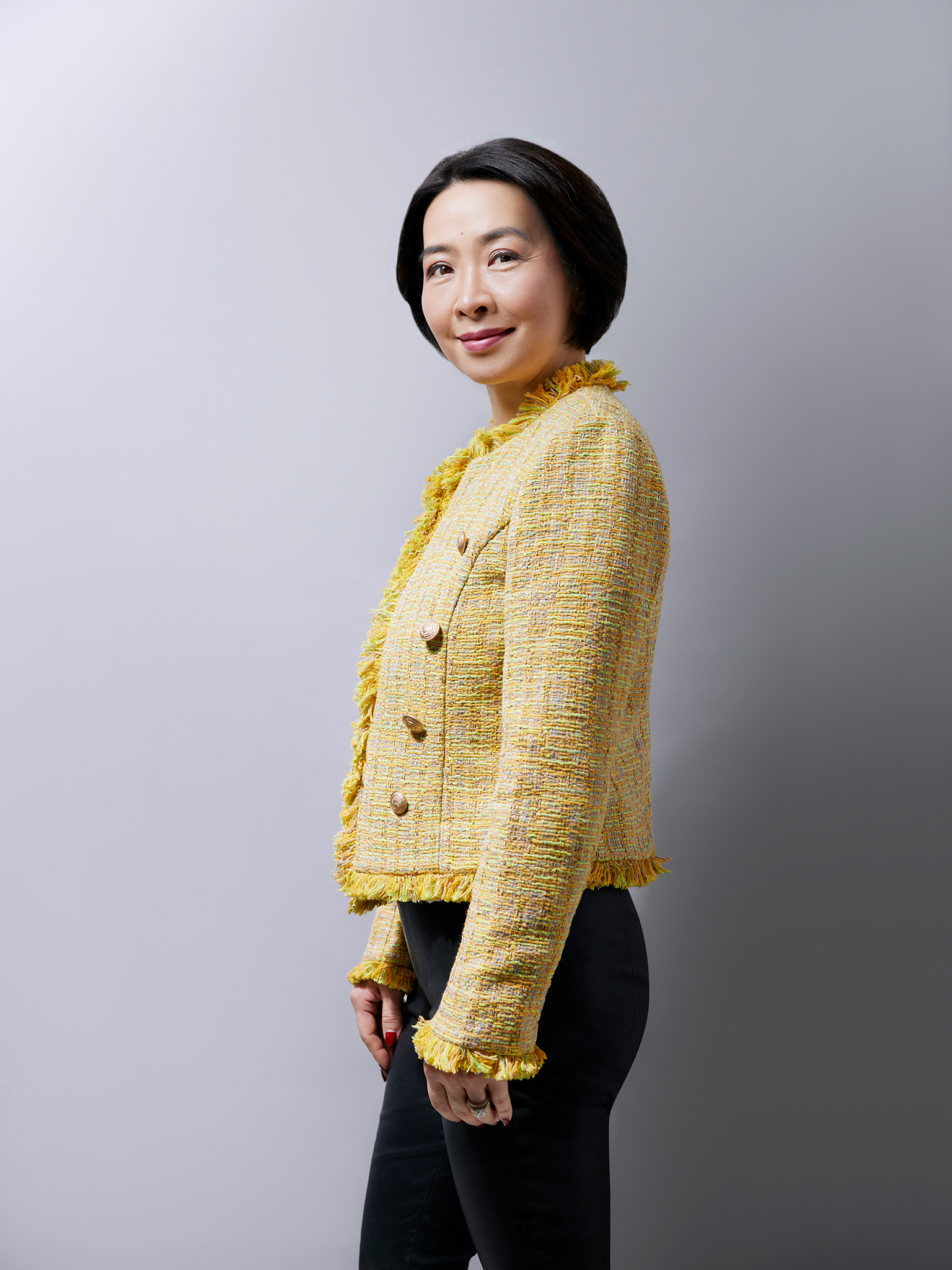Venture On
by Katherine Laidlaw
photography by Mike Ford
To say Eva Lau (MBA ’05) is on a hot streak would be an understatement. This past fall, she spoke on a panel at Princeton University. She walked the red carpet at the TIFF Tribute Awards gala. She accepted an impact award from WeWorkingWomen, a company that showcases Chinese women’s accomplishments, and then received a 2023 Report on Business Changemakers award. She gave the keynote speech at Toronto’s Small Business Forum; she was on hand to launch Schulich’s new MBA in Technology Leadership program as one of its esteemed advisory council members – and an alumna of the school.
But when I meet her at the office of Two Small Fish Ventures, the venture capital fund she founded in 2014, she’s beaming with excitement about something else entirely: a circuit board. Moments before, her small office was filled with people. She’d been expecting a founder and two engineers for a meeting, but they brought their entire team to show her what they’d created: temperature-responsive fabric, with a wearable device that she’s confident will help form the future of textiles. “It’s just an incredible experience to be able to learn from the people who are building the latest and greatest, and be part of that conversation,” she says.
Lau is part people-reader, part psychic, all venture capitalist. It’s her job to find wickedly smart people creating the next great thing and help them do it by investing with them. To say she’s good at it would be an understatement.
When I ask Lau for the secret to her fortune-telling, she laughs, and tells me about a time it failed her. She graduated from Schulich in 2005, with two young children and a husband who’d just quit his engineering job to launch a startup. When he came home one day to tell her his idea – a storytelling platform for people who wanted to read and write on their phones – she rolled her eyes. “Why would people want to do this?” she asked. “I thought, this is the stupidest idea.” The biggest phone screen at the time was the Motorola Razr, nothing like the smartphones of today. But she’d worked with her husband, Allen, enough to recognize the sparkle in his eye when he’d seized on an idea he couldn’t let go. She agreed to try it.

“The thing that still keeps me going is I felt, and feel, that I’m sitting at the bleeding edge of technology,” she says.
That company would go on to become Wattpad, and would be acquired 14 years later for US$600 million. And Lau would take every hard-fought victory and lesson she learned along the way to inform what’s become a well-honed instinct for what’s next.
Lau grew up in Hong Kong, and moved to Canada on her own at 17 to finish high school at a girls’ boarding school. She enrolled in industrial engineering at the University of Toronto. During her first year, her parents and sister finished the immigration process and joined her.
They said, are you guys out of your mind? Two people in the same company? At a startup?
Just before her first year of university, she met Allen Lau through the youth group at her church. He was also studying engineering at U of T, though he was a year ahead. The two became friends and, after an eight-year-long courtship, got married. They became early employees at Delrina, one of Canada’s first successful software startups, before it was acquired by Symantec. Lau’s in-laws thought they were crazy. “At the time, they said, are you guys out of your mind? Two people in the same company? At a startup? What if they failed?” she says. They didn’t, and the sale gave the couple enough savings to dive deeper into the world of startups. From there, they worked at Brightspark Ventures, helping founders find market fit and iterate their products.
So the pair knew enough about the industry and each other by the time Allen dreamed up Wattpad that Lau agreed to give him two years. They’d bet everything they had, and two years in, they were on the brink of selling their house to continue funding the company. “I was OK to lose everything,” she says. “But at the same time, I had this huge fear of betting my children’s future.” Still, every time they came close to the edge, another door would open that encouraged them to keep going.
After two years of grinding, making no money and going further and further into debt, the Kindle came out, sparking a mobile reading boom that would launch Wattpad into a new stratosphere of readership and possibility. Eva formally joined the company in 2009 as head of content and community, helping to turn the company into a platform with more than 18-million users by 2014.
That year, Lau decided she needed to step back from the company. She and Allen spent their mornings working on Europe time, their afternoons on North America and their nights on Asian readers and writers. She could outsource cooking. She could outsource cleaning. But she couldn’t outsource mothering, so she took some time to care for her daughters. “I was trying to figure out what was next for me,” she says. “And I started meeting with entrepreneurs.” During that time, she began to field calls from entrepreneurs across the country asking for her feedback and advice. She’d scaled a company into a massive success, and they hoped she could guide them to do the same.
As she delved deeper into what founders were thinking about and creating, coffee meetings turned into pitches, which turned into writing cheques. She stayed disciplined, offering angel investments to only the most transformative ideas that crossed her desk. After two major wins from her angel investments in Bitstrips, which was acquired by Snapchat, and Skip the Dishes, she decided to raise her first venture fund..
Back at her office, a room off a hallway filled with offices shared by other enterprises in Toronto’s MaRS building, Lau exudes passion and poise in equal measure. She wears a crisp white shirt with balloon sleeves, and white sneakers studded with silver spikes. When I suggest she might fit the definition of “cool mom,” she laughs, before recalling it was she who suggested her 21-year-old daughter get on Threads when it was released, not the other way around.
Right now, it’s the most interesting time in the decade. Everything is a big swing
Lau is laser-focused on building out her fund’s portfolio. In 2022, she closed US$24 million for her third fund, with an eye to investing in startups with two things: gritty, globally minded founders and transformative technology. By last fall, Lau was on track to close US$30 million for 2023. She’s looking for tech that transforms user behaviour, particularly tech related to the next frontier of computing. “Right now, it’s the most interesting time in the decade. Everything is a big swing,” she says. She’s making big bets on everything from AI to blockchain to semiconductors and computing. Some of them have already paid off. Lau was an early investor in Ada, an AI customer service chatbot company that’s now reached unicorn status, valued at more than $1 billion. She also helped mentor and invest with the founders of BenchSci, a company that uses AI to accelerate drug development and that aided in the development of COVID-19 vaccines.

Lau’s husband, Allen, joined Two Small Fish two years ago as operating partner, continuing their unique decades-long professional partnership. “The fun thing, and the boring thing, is me and Allen don’t have a lot of hobbies. Really trying to be at the forefront of technology is what makes us really excited,” she says. And while sometimes the two of them are so in tune the rest of their team has to play catch-up, or they have to remind each other just to enjoy morning coffee at the cottage without work talk, their partnership really comes down to: “you watch out for me, and I watch out for you,” Lau says.
The firm is constantly examining new ideas, seeing upwards of 1,000 pitches a year from aspiring entrepreneurs. “We want to be one of the best-performing funds. And I’m confident we can do that. And I think we also want to create far more success stories. And I think we absolutely can.” Lau describes herself as an artist at heart, an engineer by training, and an investor by profession, and what underscores each is a relentless curiosity and desire to be delighted by what’s new. After all, who doesn’t want to be the first person to know about the next big thing? Meeting the people on the vanguard of that transformation is what keeps her motivated. “We’re two small fish in this ginormous ocean of innovation,” she says. “But we believe we’re two mighty fish.” ■